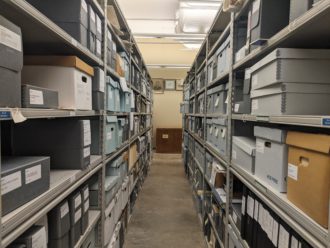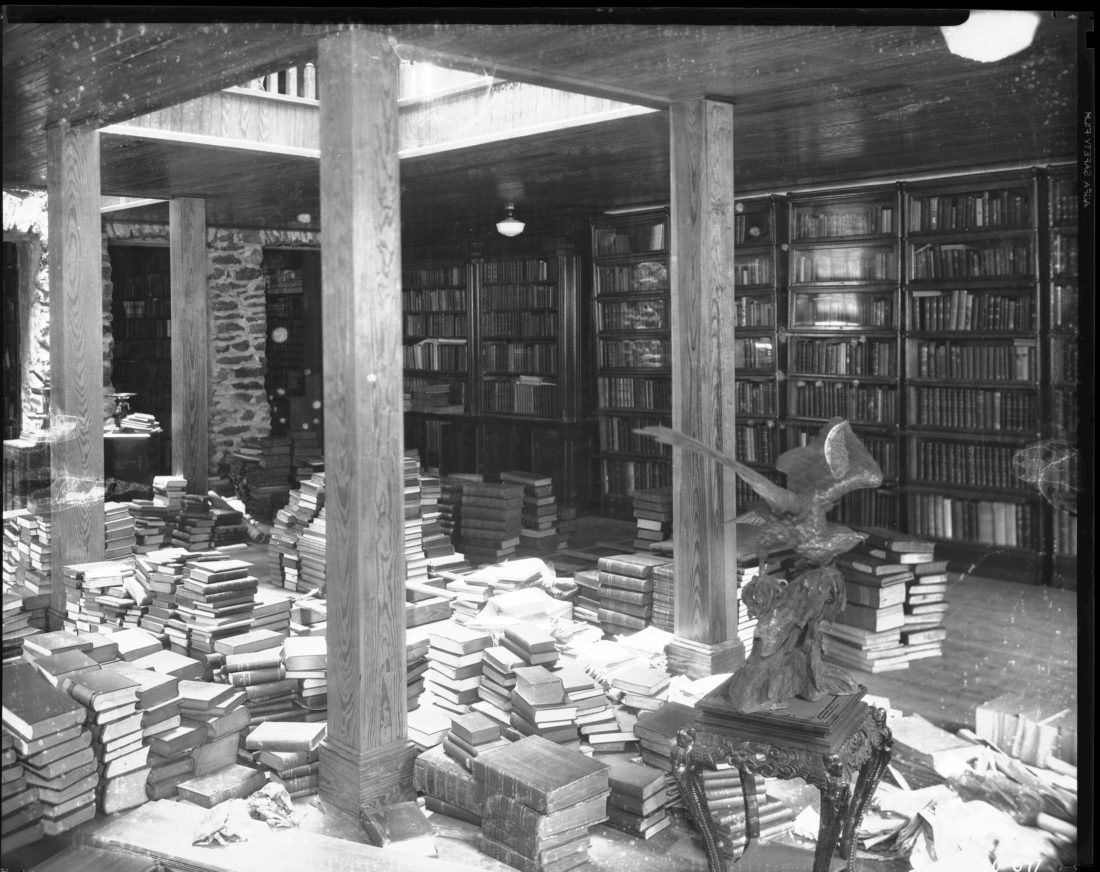There’s only one place in the world where you can leaf through Asheville GreenWorks’ 50-year history, listen to a speech Martin Luther King Jr. delivered in Montreat in August 1965 and view a 1764 map of Cherokee land by English cartographer Thomas Kitchin: Buncombe County Special Collections, tucked away on the lower level of downtown Asheville’s Pack Memorial Library.
BCSC has collected, curated and cared for items related to the history of Asheville, Buncombe County and Western North Carolina since 1935, 16 years after Asheville’s first public library opened in 1919. The collection is currently managed by WNC native Katherine Cutshall. She fell in love with the archives, she says, while researching her master’s thesis on the history of local tourism at UNC Asheville.
“Things that [a university library such as] Duke would never collect, like [local] T-shirts and bumper stickers, I’m like, ‘Yes, bring it on,’” Cutshall says of the library’s collection. “It’s nostalgia. That’s what makes our community feel like a community.”
Since becoming BCSC’s manager in March 2020, Cutshall has prioritized diversifying its holdings to better reflect everyone who has lived in and shaped the region. At the heart of this effort is the Black Asheville History Project, which aims to ensure that at least 25% of the collections’ catalog centers on the local African American experience.
However, Cutshall argues, chronic understaffing and a lack of funds have jeopardized both that goal and the condition of the collection’s current holdings. Although a dedicated fund to maintain BCSC has existed since 1987, she continues, legal issues have prevented her from accessing it.
“The library’s getting shortchanged here,” says Philip Blocklyn, a member of the Friends of the Buncombe County Special Collections board of directors.
A complicated history
The public library did not have a special collections section until local attorney and historian F.A. Sondley bequeathed his 45,000-volume personal library, as well as thousands of artifacts — rocks and gems, birds’ eggs and nests, paintings and even firearms — to the city upon his death in 1931. That trove constitutes the core of the modern-day BCSC.
According to a 48-page report on the history of the Sondley collection compiled by Blocklyn, Sondley’s bequest placed stifling legal stipulations on the city. The collection could not be broken up and needed its own space and staff separate from the rest of the library. Most significantly, Sondley insisted that only “well conducted white people” be allowed to access the materials.

Library records show staff and trustees citing this proviso as a reason to delay the integration of Pack Library throughout the 1950s. Only when students from the Asheville Student Committee on Racial Equality protested did the trustees vote to integrate the library system on Sept. 15, 1961.
After integration, the legal obstacles continued. The size of Sondley’s collection made it difficult to maintain, but library officials feared that nothing could be sold without breaking the terms of the bequest. Buncombe County, which assumed full responsibility for the library system from the city in 1980, proceeded to take its own collection to court.
Following a favorable 1986 ruling, 20,000 of Sondley’s volumes, either duplicates or books with no local relevance, were sold to a Chapel Hill bookseller for $375,000. In a subsequent 1992 decision, $25,000 of those proceeds were reserved for improvements to the collection, with the remainder placed in a trust to be managed by the county’s finance director. Each year, the library board could request up to 75% of the annual income from the trust to maintain and preserve the materials from Sondley’s original collection, as well as acquire additional materials if money was left over.
Thirty years later, in July 2022, that fund had nearly $870,000, according to county spokesperson Kassi Day. But it has not been accessed in nearly 20 years: The only relevant record Cutshall has found dates the last withdrawal to 2003.
Access denied
“In my mind, the right way to spend this money is on things that would make Sondley the man deeply uncomfortable,” Cutshall says. “I want to use this money to hire research fellows to recatalog and redescribe the papers of enslavers with an eye to the enslaved.”
Despite numerous meetings with library officials and County Attorney Brandon Freeman, however, Cutshall has been unable to access the trust fund since taking her job over two years ago. She says the county hasn’t been clear about what entity has the legal right to tap into the money.
The 1992 court ruling establishing the trust fund states that “the Board of Trustees of the Asheville-Buncombe Library System” must request any disbursement. However, that body was dissolved in 2013, when Buncombe created the Culture and Recreation Authority.
The CRA was itself dissolved the following year after action by the N.C. General Assembly, and a new library board of trustees was established in 2017. That entity was renamed as the Library Advisory Board in 2018; both current board Chair Keely Knopp and Cutshall say they were informed that the group had no control over the Sondley trust fund.
When Xpress reached out to the county in October, its response appeared to support this conclusion. “The county attorneys and our former library director [Jim Blanton, who left Buncombe for Roanoke, Va., earlier this year] have been working to evaluate the best process to access and use these proceeds in the manner set forth in the agreement and court ruling,” Day said. “We are hopeful to have a process in place soon.”
In subsequent comment, however, county spokesperson Lillian Govus said that the LAB was the correct board. “The library board has, and has had, the right to request those funds. If they were to make the request, our legal and finance would have to work with the library director to direct the best uses for those funds to ensure they comply with the agreement and all of its stipulations,” she told Xpress Nov. 18.
“I’m pleased to learn about this opportunity to help fund special collections,” Knopp said when given this information. “We’ll be discussing how best to take advantage of the Sondley trust at our next Library Advisory Board meeting in January.”
Accessing the Sondley fund’s income, Cutshall says, grows ever more pressing given the state of many of the materials in her care. As one example, she cites a likely one-of-a-kind manuscript copy of Thomas Dixon’s novel The Leopard’s Spots, the first of a trilogy that inspired D.W. Griffith’s white supremacist film The Birth of a Nation. (Dixon briefly had an office at 61 Haywood St. in downtown Asheville as he attempted to develop a nearby mountain retreat.)
Written on fragile onionskin paper, the text features Dixon’s own penciled corrections. In a casual conversation with an appraiser, Cutshall was told that the manuscript might be worth as much as $500,000 — in its current condition. “That pencil mark is going to start to deteriorate, and I don’t know how to deal with that,” she says.
The informal nature of that figure highlights another issue: The collection’s holdings have not been appraised since the early 1990s. At that time the gems alone, most of which reside in a bank vault in the downtown Wells Fargo building, were valued at $2.5 million.
Keeping it local
As valuable as the gems are, Cutshall says most of them do not fulfill BCSC’s mission of “actively collecting, preserving, promoting and providing equal access to the history of Asheville, Buncombe County and the surrounding area.” She believes that a new appraisal of the full collection could reveal more items worth selling to make room for materials that do have local historical significance. The proceeds could also fund the conservation and cataloging of existing items.
“I’m cultivating a garden here, and if there are too many things in the garden, you can’t enjoy it,” she says. “I am denying people access to this stuff because I do not have the time and the staff and the monetary resources to make this happen.”
Cutshall says a lack of resources and legal uncertainty have already resulted in missed opportunities. Earlier this year, a series of watercolor portraits of local Black women painted in the 1930s by Emma Clary Webb Peoples, who resided in Asheville for nearly 20 years, came up for auction. Those works include a portrait of Sarah Gudger, a formerly enslaved Buncombe County woman whose oral history is archived in the Library of Congress.
“I tried to find out a way [to purchase them] but got tangled up in red tape before the auction time came,” Cutshall says.
Despite the obstacles facing Cutshall and her staff of two, she says she remains “aggressively enthusiastic” about the archives’ future. Her favorite interactions, she says, occur when people wander in with no real research question in mind — just a desire to explore their shared history.
“That’s how you build community,” she says.




Before you comment
The comments section is here to provide a platform for civil dialogue on the issues we face together as a local community. Xpress is committed to offering this platform for all voices, but when the tone of the discussion gets nasty or strays off topic, we believe many people choose not to participate. Xpress editors are determined to moderate comments to ensure a constructive interchange is maintained. All comments judged not to be in keeping with the spirit of civil discourse will be removed and repeat violators will be banned. See here for our terms of service. Thank you for being part of this effort to promote respectful discussion.